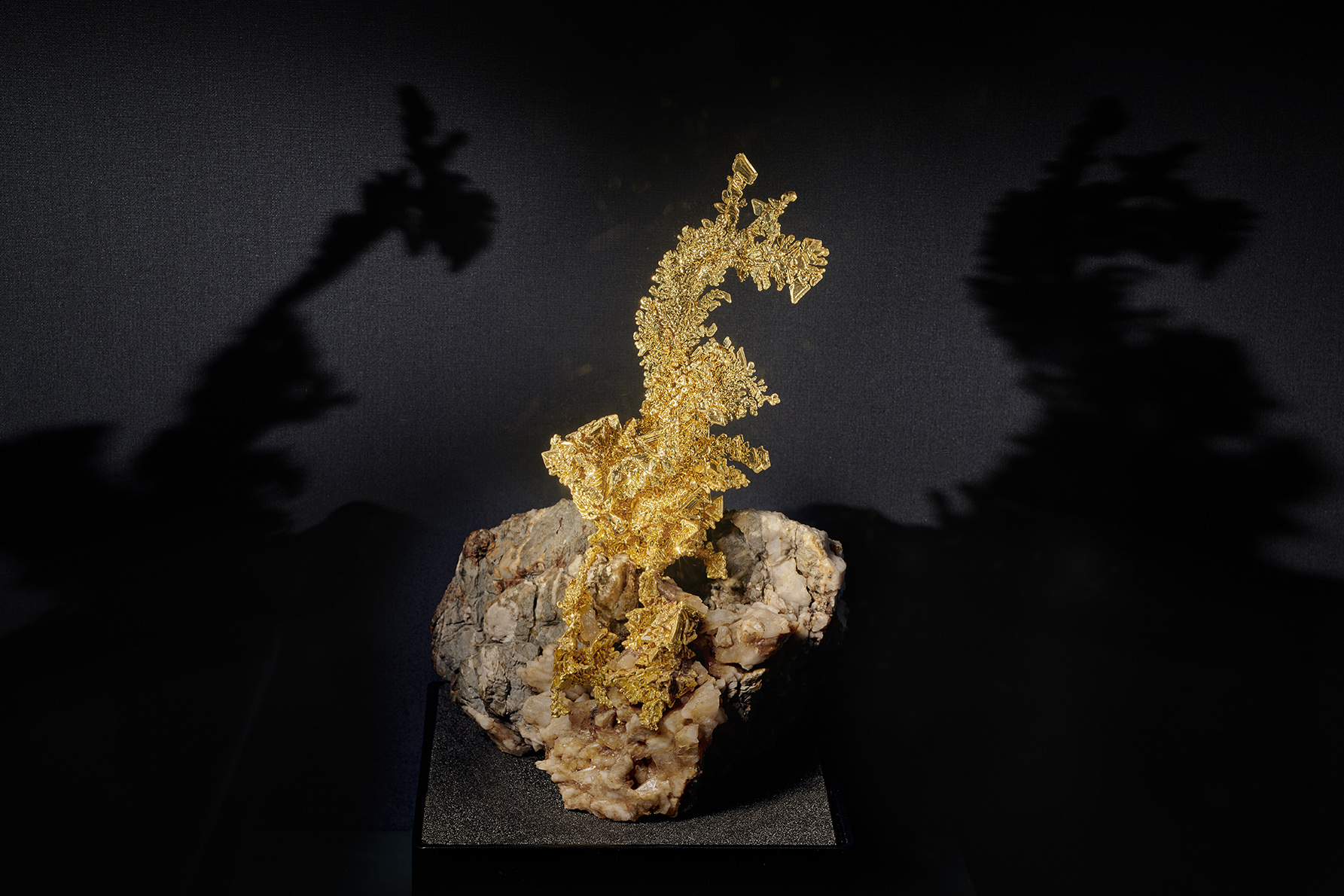Visitors to the Natural History Museum, London, can now get up close to a rare, crystallised gold specimen, nicknamed the Dragon due to its spectacular appearance. Considered to be one of the finest mineral treasures in the world, the Dragon is on loan from the Houston Museum of Natural Science and is making its debut in the UK.

The Dragon, a rare crystallised gold specimen. © Trustees of the Natural History Museum
[24 April 2025, London UK] – Visitors to the Natural History Museum, London, can now get up close to a rare, crystallised gold specimen, nicknamed the Dragon due to its spectacular appearance. Considered to be one of the finest mineral treasures in the world, the Dragon is on loan from the Houston Museum of Natural Science and is making its debut in the UK.
The Dragon can be found on display in the Museum’s recently refurbished Vault, at the far end of the Minerals Gallery. The working vault doubles as a unique gallery space, housing some of nature’s most unique and valuable treasures from the Aurora Pyramid of Hope, an unrivalled collection of 296 coloured diamonds and the Devonshire Emerald – one of the biggest and most richly coloured emeralds ever discovered.
A Natural History Museum Mineral Curation spokesperson says: “The Dragon is such a famous specimen, it’s great to have it on display for the next year alongside other treasures of the mineralogical kingdom. Being able to contrast the absolute perfection of its gold crystals with the tactile rounded crystals of the Latrobe nugget, displayed nearby, is both a unique opportunity and a real treat for anyone interested in and inspired by the most noble of metals.”
Beautifully crystallised gold is rare, and the well-formed crystals on this majestic specimen make it an outstanding find. Miners searching for gold in a region famous for producing collectable specimens discovered it within the wall of an underground mine. To ensure it was removed without damage, they used a metal detector to pinpoint its exact position. The surrounding rock and clay were then painstakingly removed, slowly revealing the gold crystals in their natural form.
With its remarkable, glittering dragon-like form and bright lustre, this specimen is a masterpiece of the mineral world.
The Dragon replaces a piece of the Winchombe meteorite, from the first meteorite fall to have been recovered in the UK for 30 years, which will be on display in the Museum’s brand new Space: Could Life Exist Beyond Earth? exhibition which opens on 16 May 2025
Ends
Press contact
Further images available to download here.
Natural History Museum Press Office
Tel: +44 (0)20 7942 5654 / 07799690151
Email: press@nhm.ac.uk
About The Natural History Museum, London
The Natural History Museum is a world-leading scientific research centre and one of the world’s most visited museums. Our mission is to create advocates for the planet – people who act for nature.
Our 400 scientists are finding solutions to the planetary emergency - from reversing biodiversity loss to resourcing the green economy.
We are seeking an additional £150 million to transform our South Kensington building: placing our groundbreaking research at its heart, revitalising four existing galleries, opening two new magnificent galleries and delighting 1 million more visitors a year with the wonders of the natural world.
About Houston Museum of Natural Science
The Houston Museum of Natural Science - one of the USA’s most heavily attended museums - is a centrepiece of the Houston Museum District. With four floors of permanent exhibit halls, and the Wortham Giant Screen Theatre, Cockrell Butterfly Center, Burke Baker Planetarium and George Observatory and as host to world-class and ever-changing touring exhibitions, the Museum has something to delight every age group. With such diverse and extraordinary offerings, a trip to the Houston Museum of Natural Science, located at 5555 Hermann Park Drive in the heart of the Museum District, is always an adventure.
Contact
Weekdays: +44 (0)20 7942 5654
Evenings and weekends:
+44 (0)7799 690 151
Email: press@nhm.ac.uk